


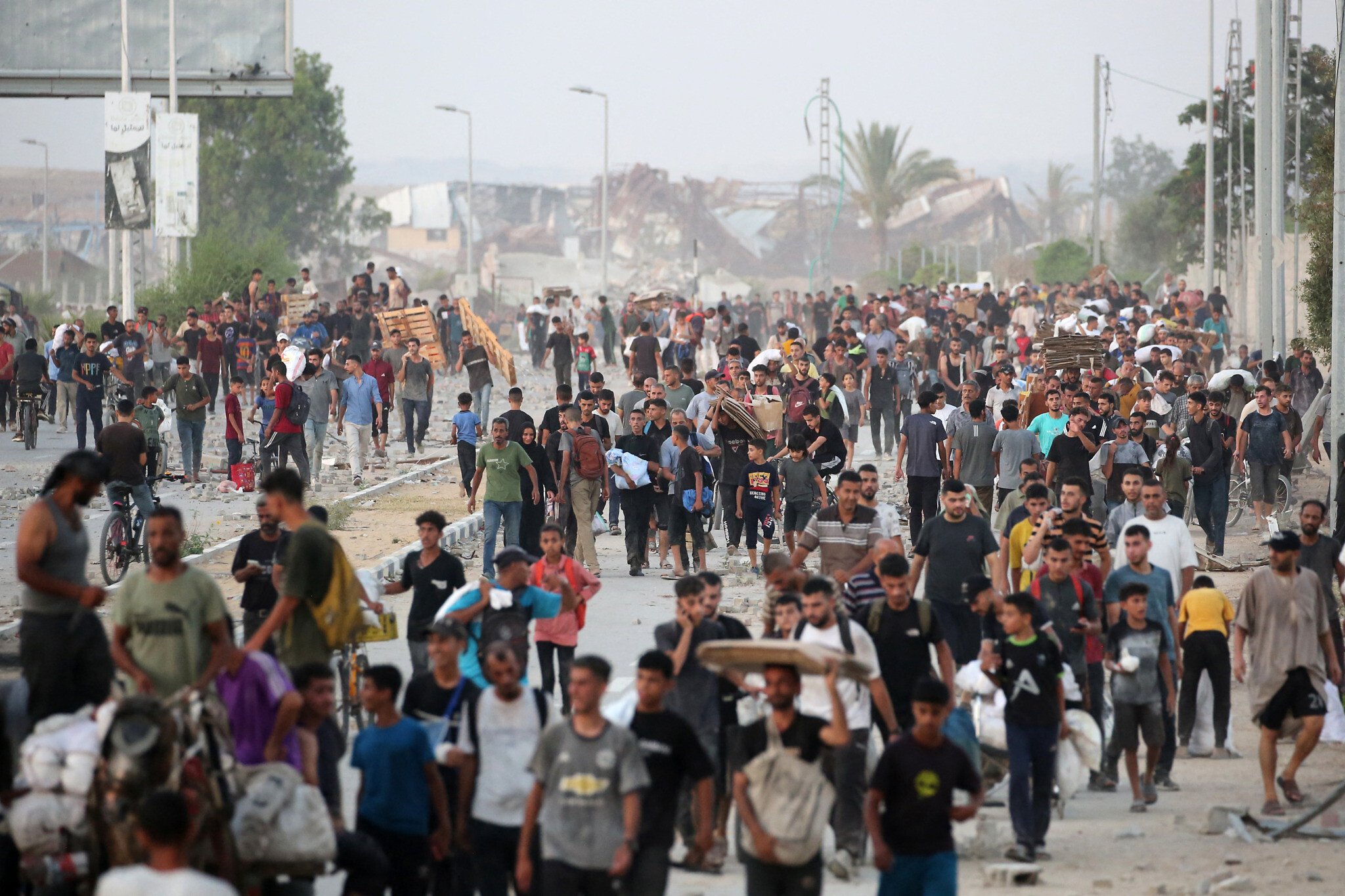
The United Nations and Israel on Wednesday traded accusations of blame for the mounting hunger and humanitarian crisis in the Gaza Strip, as reports and condemnations continue to amass over the dire conditions the enclave’s residents are facing.
Israel said Tuesday that, despite reports that Palestinians in Gaza are facing severe food insecurity and starvation, it allows more than enough aid to enter the Strip, and that the UN was responsible for the lack of distribution, as it is failing to pick up aid that has been amassing on the Gazan side of the border.
Responding to the accusations, UN spokesperson Stephane Dujarric said Wednesday that Israeli authorities have not been giving the necessary approvals for UN staff to even reach that assistance, let alone be able to pick it up and distribute it.
“The Kerem Shalom Crossing is not a McDonald’s drive-through where we just pull up and pick up what we’ve ordered,” Dujarric said during a briefing.
“To collect supplies that have reached any of the Israeli crossings around Gaza — all of which are fenced off and heavily guarded — drivers need multiple access approvals as well as a pause in the bombing and for the iron gates [at the crossing] to slide open,” the UN spokesperson continued. “We have to be allowed to come in with our own trucks. The goods have to switch from one truck to another. It’s a very lengthy procedure.”
“There are tremendous bureaucratic impediments. There are tremendous security impediments, and frankly, there’s a lack of willingness to allow us to do our work,” he said.
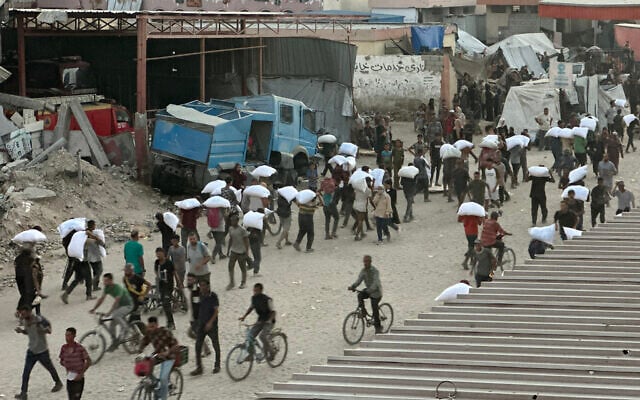
Even in cases where the UN is able to reach the aid and distribute it, “all too often, civilians approaching our trucks are shot at or trampled while trying to get food,” Dujarric noted. “We must get reliable assurances that troops would not engage or be present along the routes of our convoys.”
The UN has recognized that an increasing number of its convoys have been looted by desperate Gazans, but argues that only by further surging the flow ow aid into and throughout the Strip can the matter be adequately.
Responding to Dujarric’s comments, COGAT — the Israeli military body responsible for facilitating the entry of aid into Gaza, told The Times of Israel that it has made efforts to “improve the collection and distribution of aid from crossings, including increasing the number of access points and operating hours, formulating joint plans with the UN, and more.”
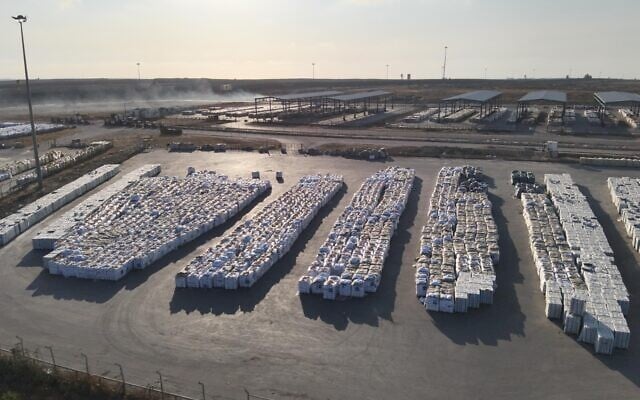
“Despite these efforts, a significant portion of the trucks remain uncollected,” COGAT said, insisting that it will continue working to facilitate the entry of aid into the Strip in accordance with international law.
Also on Wednesday, when asked if it would agree to offers from the Gaza Humanitarian Foundation to collaborate in order to distribute aid in Gaza, Dujarric said the UN welcomes cooperation with any organization that abides by humanitarian principles, but that as of now, the GHF does not fit that criteria.
“One of them being that — don’t set up an operation that will increase the risk of people to be shot at or trampled while trying to get food,” he said, in a shot at GHF, which has been operating a small number of distribution sites in remote, militarized areas of Gaza that forced Palestinians to walk long distances, while crossing IDF lines in order to pick up aid.
For its part, GHF said it has been able to distribute over two million meals per day.
But GHF’s boxes are largely filled with dry food products that still need to be prepared elsewhere in a war-ravaged Strip with scarce clean water, cooking fuel or equipment.
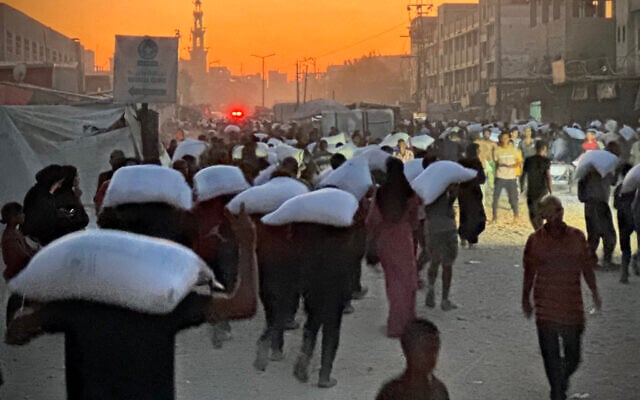
Dujarric said at a press briefing that the UN has distributed 158,000 cooked meals at 64 community kitchens since Sunday, noting however, that the figure is declining due to the lack of food in the Strip.
“We have a system that works. All we’re asked is to be allowed to use that system. I don’t think we need to add another layer of for-profit organizations,” he added.
Also on Wednesday, Palestinian Authority and Israeli envoys traded accusations at a UN Security Council meeting over Gaza’s hunger crisis, with PA Ambassador Riyad Mansour saying, “Every day now we receive heart-wrenching messages from Gaza…’I am hungry.'”
“This is what our children are saying and every individual in Gaza is saying: ‘I am hungry. There is no food for my family. We are dying. Help us,'” he said. “What should we tell them? What should the Security Council tell them? That the whole world is against this starvation policy and yet it is worsening?”
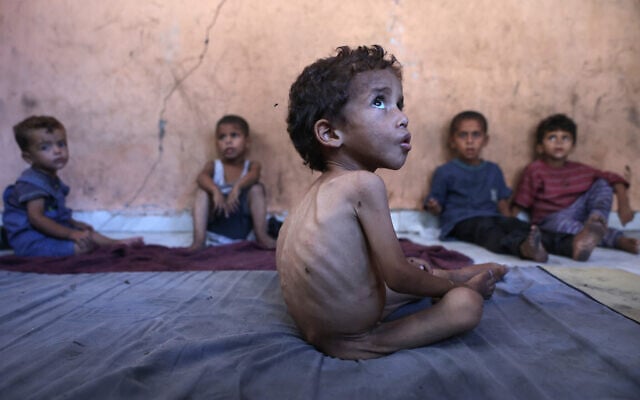
But Israeli Ambassador Danny Danon accused Hamas of using the misery to “feed it into their propaganda machine.”
“For Hamas, the suffering of its own people is their greatest weapon,” he said.
Stating that Israel was making the Middle East safer, Danon accused the UN’s Office for the Coordination of Humanitarian Affairs of “bias” against the Jewish state.
OCHA is a “propaganda machine” against Israel, he said, which purposely undercounts aid trucks heading into Gaza.
“We will not work with organizations that have chosen politics over principles,” Danon said, with Israel in future granting just one-month visas to the agency’s international staff.
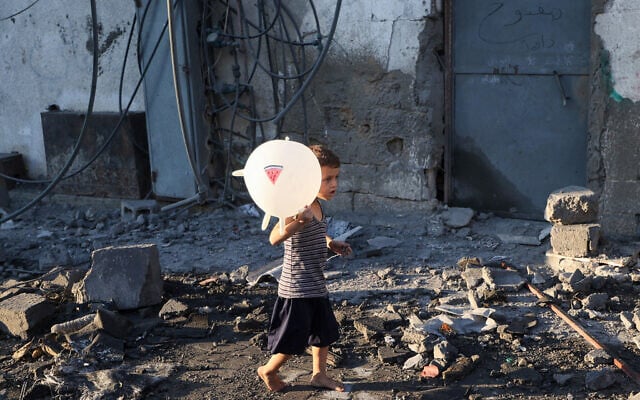
“OCHA has long ceased to be a humanitarian body. It is a Hamas propaganda arm that operates from within UN institutions, and uses false data and inflammatory discourse to harm Israel,” he charged.
In response to Danon, OCHA spokeswoman Eri Kaneko said: “Any reduction of our own staff will stifle our already curtailed efforts to reach civilians across Gaza in urgent need of life-saving humanitarian aid.”
More than 100 aid and human rights groups said earlier Wednesday that “mass starvation” was spreading in Gaza, and France warned of a growing “risk of famine” caused by “the blockade imposed by Israel.”
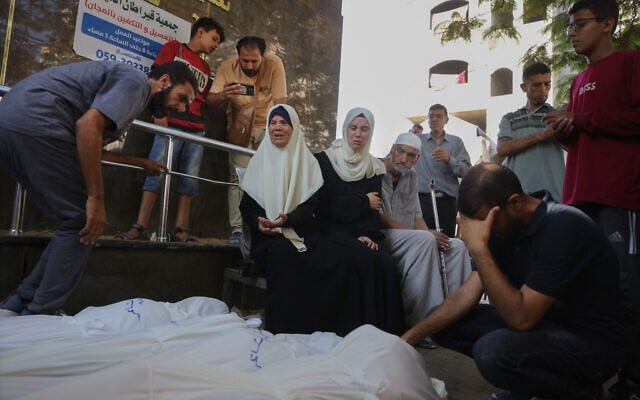
“I don’t know what you would call it other than mass starvation — and it’s man-made,” World Health Organization chief Tedros Adhanom Ghebreyesus told reporters.
But an Israeli government spokesman, David Mencer, said there was “no famine caused by Israel. There is a man-made shortage engineered by Hamas.” Mencer accused Hamas of preventing supplies from being distributed and looting aid for themselves or to sell at inflated prices.
President Isaac Herzog, visiting troops in Gaza, maintained that Israel was acting “according to international law”, while Hamas was “trying to sabotage” aid distribution in a bid to obstruct the military campaign against it.
The lack of food and water was affecting the ability of journalists to carry out their work documenting the conflict, according to AFP correspondents in Gaza who said this week that desperate hunger and lack of clean water is making them ill and exhausted.
Some have even had to cut back on their coverage of the war, now in its 22nd month, with one journalist saying “we have no energy left due to hunger.”
The war in Gaza began with the Hamas-led October 7, 2023, invasion and massacres, during which terrorists killed some 1,200 people and kidnapped 251 hostages back to Gaza.
In the ensuing war, some 58,000 people in Gaza have been killed, according to Gaza’s Hamas-run health ministry. Hamas casualty figures cannot be verified and do not differentiate between combatants and civilians.
